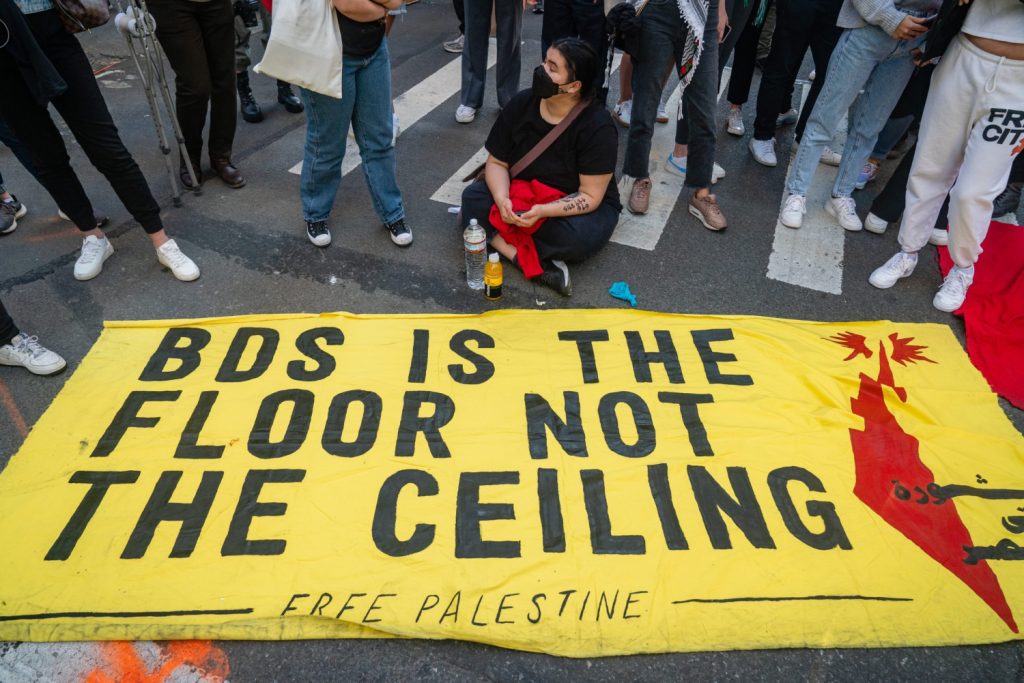Australia/Israel Review
Biblio File: Battling the Boycotters
May 4, 2023 | Ahron Shapiro

 Challenging the Boycott, Divestment and Sanctions (BDS) Movement: 20 Years of Responding to Anti-Israel Campaigns
Challenging the Boycott, Divestment and Sanctions (BDS) Movement: 20 Years of Responding to Anti-Israel Campaigns
Edited By Ronnie Fraser, Lola Fraser
Routledge, Feb. 2023, 262 pp., A$ 59.19
The Boycott, Divestment and Sanctions (BDS) campaign against Israel is not the grassroots “movement” it purports to be, but a self-aggrandising propaganda and intimidation syndicate strategically funded by politicised NGOs to an astounding level estimated to exceed US$100 million (A$151m) annually.
This fact, revealed by Professor Gerald M. Steinberg, President of the Jerusalem-based watchdog NGO Monitor in his standout submission to the newly published academic anthology, Challenging the Boycott, Divestment and Sanctions [BDS] Movement: 20 years of responding to anti-Israel campaigns, is one of the many valuable insights that can be gleaned from the book.
As its title suggests, editors Ronnie and Lola Fraser pin the conceptual birth date of BDS to the initial call for an academic boycott of Israel, in April 2002, in the aftermath of the infamous September 2001 World Conference against Racism, held in Durban, South Africa. That is certainly more accurate than the revisionist narrative promoted by the BDS movement today, which fallaciously claims that BDS grew organically out of a 2005 Palestinian initiative, the Palestinian Campaign for the Academic and Cultural Boycott of Israel.
Yet the roots of BDS certainly go back further than Durban, and are in fact a modern adaptation of organised Arab boycotts of the Jewish businesses in the land of Israel that predate the establishment of the state by many years and took various forms. Following the establishment of Israel, a formalised boycott was eventually organised on a state level, and this sputtered along until the 1991 Madrid Peace Conference and 1993 Oslo Accords. These early efforts did not have major effects on the Israeli economy, but did manage to deter quite a few prominent global corporations from entering the then-tiny Israeli market for many years.
Durban itself was little more than a reboot of the demonisation and delegitimisation campaign against Israel that was served up at the UN by the Soviet bloc in the mid-1970s after successive failures by their Egyptian and Syrian clients to defeat Israel militarily. As Steinberg astutely reminds us:
The agendas, list of speakers, and draft texts [at Durban] were manipulated in order to revive the 1975 UN General Assembly resolution that declared Zionism to be a form of racism. The 1975 UN resolution had been formally rescinded in 1991, but the UN and NGO mechanisms remained active. With the collapse of the Oslo process and the escalation of violent attacks and responses, the political conditions were ripe for a worldwide soft-power campaign based on this and related themes.
In other words, the Palestinian rejection of Israeli peace offers in 2000 and 2001, together with Palestinian President Yasser Arafat’s decision to launch the Second Intifada beginning in September 2000, created an opportunity for radical anti-Israel peace rejectionists on the UN and NGO scene to plan their political comeback with Durban as the springboard. BDS would be a key part of their renewed offensive.
It bears clarifying that when I say peace rejectionists, I’m not talking only about supporters of the Islamist terror group Hamas or Iranian proxy Hezbollah, for example, whose rejectionism is an integral part of their identity. Regrettably, this rejectionism remains pervasive even among ostensibly mainstream Palestinian intellectuals like Nadia Hijab, co-founder of the Palestinian think tank Al-Shabaka, who in 2010 authored the detailed policy brief “What if Peace Talks ‘Succeed?” Hijab’s brief, which remains as relevant today as ever, lays down concrete strategies to continue the struggle to dismantle Israel in the event Palestinian leaders agreed to make the concessions required to close a peace deal.
In the short term, the goal of the radicals who hijacked the agenda at Durban was to bury hopes of reviving the faltering Oslo Israel-Palestinian peace process. In the long term – which includes the present day – the goals are to demonise and isolate Israel as a pariah state and annul Israel’s right to exist as a Jewish and democratic state in the eyes of the international community.
As is touched upon in several passages in the book, BDS organisers proved to be adept opportunists, taking full advantage of the power of the internet to spread their hate, especially through social media, as well as finding ways to exploit social and cultural trends.
Whereas once boycotts of Israel failed to find broad sympathy outside the Arab world, BDS focused its resources on both proselytising the Palestinian narrative and rebranding anti-Israel activism and even aggressive intimidation and bullying as a noble struggle for social justice blessed with a halo of smug self-righteousness. In recent years, BDS has hitched its wagon to the fashionable left-wing ideology of “intersectionality”, seeking to recast the complicated and supremely political and nationalist Israeli-Palestinian conflict as a simplistic morality play featuring all-powerful, cruel and racist Israeli oppressors and their helpless Palestinian victims.
In the United States, BDS formed alliances with the Black Lives Matter movement, framing Palestinians as people of colour and Israelis as privileged “whites”. This is in spite of the fact that the Jews of Israel are ethnically diverse, with the majority descending from families who were once refugees from Arab and even African lands, while those with European ancestry have a history replete with institutionalised discrimination, relentless persecution, pogroms and genocide.
According to the revisionist BDS narrative, Palestinians are indigenous, Jews are “white” foreigners, and Zionism is a racist and colonialist ideology. In reality, Jews maintained a constant presence in their homeland throughout two millennia of national exile, while Zionism simply asserts the Jewish people’s right to self-determination in the land where they became a people.
The anthology covers all this ground and more, over the course of its 11 submissions from a varied selection of scholarly contributors. The Frasers say their vision for the book was to detail how Israel and its supporters have responded to BDS over the past two decades. It is by no means comprehensive, but each essay approaches the matter differently, which helps maintain reader interest throughout, while the endnotes give the reader many opportunities to take a deeper dive into the material.
The book is, however, not without its faults. Most of the essays in the anthology assume an in-depth understanding of the Israel-Palestinian conflict and appear to take for granted that the reader is already favourably disposed towards Israel. This can lead to some unintended consequences.
A case in point appears right in the book’s introduction, where the Frasers casually mention the UN’s 2009 inquiry into the Gaza war of the previous year, known as the Goldstone Report, and explain how it “found that Israel had carried (sic) ‘deliberate attacks on civilians’ with ‘the intention of spreading terror’ [and this] resulted in the Israeli government taking seriously the threat of BDS and delegitimisation.” Left unsaid was the fact that Goldstone himself eventually discredited and repudiated his own report over its many failings. Most university students today – too young to remember either the Gaza war or the sham of the UN inquiry that followed it – might read the passage as written and justifiably wonder why Israel shouldn’t be boycotted and delegitimised given these “findings”.
I found that Ben Gurion University of the Negev’s Chair of Geopolitics David Newman’s essay “The Mutual Weaponisation of BDS: A perspective from Israel” to be particularly weak and disappointing, despite his making a fair number of reasonable points. I’d disagree with his claim that BDS “started as a strategy to put pressure on the Israeli government to change its policies relating to the West Bank and the Gaza Strip” and only later “transformed into a broader policy of delegitimization of the State of Israel in its entirety” (a claim he does not back up by citing any source). In an unseemly twist that you don’t often see on the pages of the same scholarly book, left-leaning Newman accuses fellow essayist Steinberg’s NGO Monitor of being essentially a shill for the Israeli right, though he grudgingly admits its research into NGO funding is on “solid ground”.
Compared to the ten other essayists, as well as the editors themselves, Newman undoubtedly serves as the dissenting opinion, declining to even pass judgement between BDS activists and those who oppose them.
“One man’s coloniser is another man’s patriot and pioneer,” writes Newman, “while one man’s traitor and antisemite is another man’s freedom fighter.”
Fortunately for the reader, the rest of the essayists offer both far stronger moral compasses and more profound and useful insights into both the BDS movement and how it can be effectively countered.
Tags: Anti-Zionism, BDS, Israel, NGOs, Palestinians






